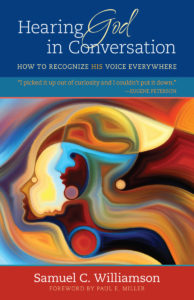When I was growing up, my dad taught me to sail our small Sunfish sailboat. We took month-long summer vacations, and we always camped on lakes, so we could challenge the wind every day.

I probably sailed with my dad for a hundred hours before I took the boat out on my own. My dad would have me handle either the sail or the rudder. Of our many hours sailing together, I’ll bet his actual instruction time totaled an hour, two at the most.
He might say, “Pull in the sail a bit,” or, “Turn a little more to the left.” (My dad didn’t care much about proper nautical terminology.) Those short comments took mere moments to say, and Dad didn’t make them often. Mostly we just sailed together for hours and hours. And bit by bit, gust by gust, wave by wave, I learned to sail.
Instead of instructing, Dad mostly just chatted.
He would ask what I wanted to be when I grew up. I’d say, “A pirate!” (of course) and he’d heartily agree (“Yo, ho, ho!”). He’d ask why I had yelled at my sister, and I’d ask why he got angry at my mom. We’d talk about books we were reading, sermons he was preparing, which girls I found interesting, and what it would be like to sail across the ocean.
Our relationship with God can be like that. Conversational.
Would We Want It Any Other Way?
When we imagine “hearing God,” we mostly picture God telling us what to do. We ask for guidance, but it means we’re asking for lectures: Do this and don’t do that. God wants conversations with us far more than he wants to lecture.
Jesus once said, “If you earthly fathers, who are evil, know how to give good gifts to your kids, how much more will your heavenly Father give good things to those who ask him!” (Matt. 7:11).
Think of your fondest memories of your fathers. How many of those memories are the times your dad lectured? Why do we think a good relationship with God would be any different? My favorite memories of Dad are discussions around the dinner table, phone calls, and sailing.
He did give advice, and occasionally (albeit rarely) I even asked for advice; but he always loved to talk with me. About life. About ANYTHING: movies, friends, spiritual quandaries, and jokes.
If our best memories of our earthly fathers are conversations not sermons, why do we think our heavenly Father (who is better than the best earthly father) wants mostly to lecture? Would we want it any other way?
We most frequently seek God’s voice during times of crisis. “I’m in trouble; I need direction!” The thing is, until we have learned to recognize his quiet voice in the humdrum of life, what chance do we have of distinguishing his voice in the maelstrom of crisis?
Let’s learn to sail our boats in a gentle breeze before we raise our sails in a hurricane.
Besides, the Best Guidance Comes Through Conversation
My dad did teach me sailing, but I never felt our sailing adventures were classroom instructions. Directions did come (“Let out the sail a bit, I see a squall coming”), but they were gusts in the winds of conversations, punctuation marks in the midst of chapters.
My ability to sail grew through persistent conversations as my dad and I sailed the seas together. It was in those communal adventures that he taught me to navigate. He never once used a whiteboard, flipchart, or PowerPoint to abstractly teach me seamanship. He taught me through a shared daily life on the waves.
On our trips together, I’d make mistakes (as would he), and the boat would capsize. We’d right it together, we’d laugh (most of the time), and we’d drag our soaking wet bodies back onboard, to match our wits against the wind and waves once more.
Through it all, I learned to sail, though his guidance was mostly unnoticed. Within a year—at eleven years of age—I was sailing the Great Lakes alone, beyond sight of land, amidst the wake of freighters, capsizing, righting, laughing, and testing my strength and courage.
Even now, when I sail as an adult, his conversational guidance is with me when I face a squall.
How Do We Have a Conversational Relationship With God?
It’s perfectly normal to talk about “normal” stuff with our friends; why not with God? He isn’t less of a person, he’s more of a person. He isn’t less interested, he’s more interested.
And he has a better attention span.
I have a daily prayer time, but my best conversations with God take place throughout the day, when driving home from an appointment or waiting in line at the supermarket. I say to God,
- My last lunch meeting didn’t go well. I said something more harshly than I meant to. Why do you think I said it that way? What is going on in me to explode like that?
- I’m tired. I feel like my daily mantra is: Too much to do, too little time to do it. What will it take for me to let go of my life? What does it mean to be satisfied in you alone?
- God, I felt alive when I gave that talk on friendship. How can I help others find friends? How can I walk in a friendship with you?
The best relationships with God are conversational. In the Garden of Eden, we know very little of Adam and Eve’s relationship with God. Except this: he walked with them in the cool of the evening.
Which is a Hebrew metaphor for God having a conversation with friends.
Sam
++++++++++++
This article includes material from my upcoming book Hearing God in Conversation: How to Recognize His Voice Everywhere. It will be released in mid-July by Kregel Publications.
I believe it will help you begin to hear God in a new conversational relationship.
Please consider pre-ordering the book now by  clicking on the link or on the image.
clicking on the link or on the image.
Topics include:
- Learning to recognize the sound of God’s voice
- Hearing God in his silence
- How to Brainstorm with God
- Hearing God in Scripture
- Hearing God for guidance
Gary Wilkerson (pastor, author, and son of David Wilkerson) said this:
A key longing in every human heart is to connect with God, to actually hear his voice. Sam Williamson has written a remarkable book that teaches both how to hear God’s voice in Scripture, and then to hear his voice in every avenue of life. It’s filled with humor, insight, practical tips, and sound theology. I can’t recommend a better guide than Hearing God in Conversation.


Leave a Reply